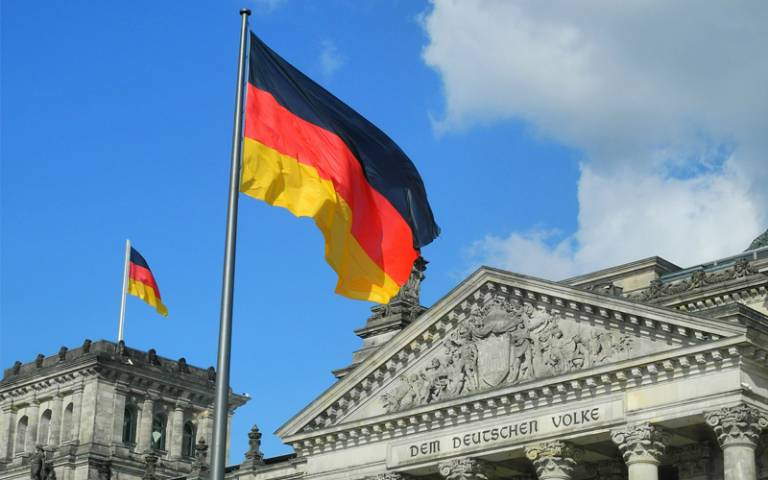Opinion: How politicians talk about coronavirus in Germany, where war metaphors are avoided
22 May 2020
Writing for The Conversation, Dr Dagmar Paulus (UCL SELCS) explains how German politicians are avoiding using war metaphors when discussing the Covid-19 virus.

Many political leaders around the world have reached for the imagery of conflict to describe the coronavirus pandemic. In France, President Emmanuel Macron said his nation was at war with an invisible enemy. Over in the US, President Donald Trump positively revels in the idea of being a “wartime president”. In the UK, Prime Minister Johnson has spoken of the virus as an “enemy” and even said that “we must act like any wartime government” to protect the economy.
But in Germany this kind of language is not circulating. The virus is not an “enemy”, and the process of containing it is not a war. Perhaps there’s a tendency among German politicians to avoid war metaphors for historical reasons. There may be a feeling that it does not go down well nationally and internationally if German political leaders speak about war, even metaphorically.
This is particularly the case because the far-right AfD party has been trying to expand the limits of what is acceptable in Germany. One of its leaders recently lamented Germany’s loss of territory after the second world war – a position that has been condemned by many, including the Central Council of Jews in Germany.
So German chancellor Angela Merkel does not use war imagery when talking about the coronavirus. In fact, she hardly uses any metaphors at all. Her first major public interaction during the crisis was a televised address on March 18. Merkel’s words to describe the crisis were simple and straightforward. She spoke of “this situation”, “a historical task”, and a “great challenge” ahead.
When Merkel alluded to the past, it was to express a desire not to return to it. She referred to her own history growing up in the GDR when emphasising that the decision to curtail democratic freedoms had not been taken lightly.
In a speech to the German parliament on April 23, Merkel again used few metaphors. She called the current situation a “real test”, “serious times”, a “dramatic crisis”, a “gigantic challenge”. The only figurative expressions she used were “thin ice” and “long-distance run”. These metaphors evoke challenge, but not combat.
It’s true that drastic words and passionate statements were never Merkel’s style, but other German politicians have taken a similar approach. Among the 16 regional leaders, two have been especially prominent in the debate about the coronavirus: Bavarian leader Markus Söder and Armin Laschet, of North Rhine-Westphalia.
Like the chancellor, Söder mostly uses straightforward vocabulary to describe the virus: it’s “an exponential development”, a “crisis”, and a “task”.
Laschet, too, has been been vocal in the debates about the coronavirus, possibly because he aspires to be Merkel’s successor as chancellor and may therefore feel the need to make his mark. He used rather more dramatic language but still stops short of going to war. He speaks of an “adversary” (but not an “enemy”) and has warned that people have to make sacrifices. By the end of April, he also had gone back to more neutral expressions: the “situation”, the “event”.
While speeches by German politicians have mostly been easy to follow and unambiguous, there has been some confusion, too. Different states across the country’s federal structure decided on different rules at the beginning of the lockdown. For example, when Lower Saxony closed DIY stores in March, there was an exodus of people to neighbouring states where they were still open, causing Lower Saxony to backtrack.
Low death rate
Overall it looks like Germany has done comparatively well so far. The German government imposed containment measures on March 17, at a fairly early stage in the pandemic. At the time of writing, there were 179,000 cases and 8,300 deaths in Germany, which is far fewer than in many other European countries.
The response from the German public has been mostly positive. Approval ratings for Merkel and her party, the centre-right CDU, went up in recent weeks.
However, a small but vocal minority of protesters has been demanding an end to the measures. Paradoxically, they are gaining traction at the moment, now that the lockdown has been relaxed, and although the measures in Germany were fairly mild compared to Spain, Italy, or France.
The protesters are a rather strange alliance – some are worried about their democratic rights or about the economy, but others are members of the extreme right, conspiracy theorists, anti-vaxxers, and anti-Semites. The financial crisis of 2008 had in all probability contributed to the rise of the AfD. Now, with another massive economic slump on the horizon, the threat of right-wing extremism is likely to increase.
This article was originally published in The Conversation on 22 May.
Image:
Image by Karlheinz Pape from Pixabay
Links
- Dr Dagmar Paulus’s academic profile
- UCL School of European Languages, Culture and Society (SELCS)
- UCL Faculty of Arts & Humanities
 Close
Close

